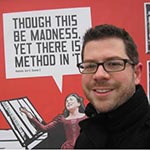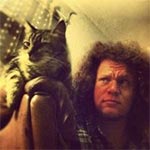Why English at WCU?
WCU's English major prepares you to succeed in any profession that values the kind of cogent writing, critical thinking, creative problem-solving, and sophisticated research central to the discipline of English. Our graduates enjoy thriving careers in publishing, journalism, education, management, law, marketing, advertising, social media, human resources, and business. Many pursue advanced degrees in English, law, information & library science, and other fields. Our alums have also found success and acclaim as published authors.
We invite you to read the alumni testimonials below to learn what our graduates have to say about the value and versatility of their WCU English degrees.
We also encourage you to check out this video from the 2025 "What Can You Do With An English Degree" panel, featuring recent WCU English majors discussing how they've used their degrees in their careers. You can also watch the 2024 panel, 2023 panel or the 2019 panel.
Tyler Bradway, Class of 2006
Assistant Professor of English, State University of New York, Cortland
Higher EducationWhat is the difference between a poem and a recipe? The answer has eluded me for nearly
twelve years, ever since I began my English major at West Chester University. In my
first semester, I took Dr. Carolyn Sorisio's "Conventions of Reading." On the first
day, we read Emily Dickinson's "recipe" for black cake. Read More.
Kim (McGrath) Haemmerle, Class of 2008
Talent Acquisition/Research, eBay Enterprise
Market ResearchI always find it humorous when people ask, "What can you do with an English degree?"
I think the question should really be "What can't you do with an English degree?"
As an English major at WCU, I honed skills that enable me to write effectively, read
critically, research strategically, and think analytically. Read More.
Jessica Ohnikian, Class of 2013
Global Education Sales Coordinator, John Wiley & Sons
PublishingI grew up with a mother in the medical field and an entrepreneur father in retail,
so my choice to study English in college came as a surprise to my parents. But it
was also completely understandable; I'd always been drawn to the creative side of
life. Read More.
John Dixon, Class of 1998 (M.A.)
Fiction WriterI started writing stories during third grade. My kind teacher, Mrs. Wolfe, encouraged
me, even though I wrote crazy stuff: several tales about a fire-breathing chicken
monster; a thriller about a racecar driver who crashed into a wooded ravine, only
to be set upon by moaning zombies; and a chiller about a hulking Frankenstein knock-off
I called "Gill," because he could breathe underwater. Read More.
Chris Timmins, Class of 2005
Sales Account Executive, Salon Media Group
2006 Recipient, John Feely Hopkins Short Story Award
Marketing and AdvertisingWest Chester University is an English major's dream. From the challenging coursework
and supportive faculty, to working at the annual poetry conference and building chapbooks
at Aralia Press, I had every opportunity to dive into the written word. Read More.
Matt Thomas, Class of 2004
Manager of Content & Social Strategy, The Neat Company
Marketing and AdvertisingI went to college to become an English teacher. Well-that's not true. I went to college
to get a computer science degree, but I soon realized that I was really bad at calculus.
Plus I never really had a clear idea what I'd do with a comp-sci degree anyhow. So
I ended up earning a BSEd in English and teaching high school for a few years. Read More.
Vanessa Cozza, Ph.D., Class of 2003 (B.A.) and 2005 (M.A.)
Assistant Professor of English, Washington State University Tri-cities
Higher EducationI graduated from West Chester University in 2003 with my B.A. in Literature and in
2005 with my M.A. in Literary Studies, specializing in Rhetoric and Composition. My
English education at WCU paved the way for me to gain valuable teaching experience
and to later pursue an advanced degree. Read More.
Amy Festa, Class of 2011
Marketing & Communications Coordinator, United States Tennis Association (USTA) Middle
States
Marketing and AdvertisingWhen I chose to become an English major at West Chester University, I was often asked
the question, "What are you going to do with that?" My answer was simple: "Whatever
I want." I arrived at WCU with a passion for writing but no clear plan for the future.
Read More.
Brian Fanelli, Class of 2006
Poet (twice nominated for a Pushcart Prize); Instructor, Lackawanna College
Creative Writing and Higher EducationWhen anyone asks me why I became a poet, I fondly recall the poetry courses that I
took during my junior and senior years at West Chester University. I can still remember
sitting in a classroom in Main Hall, critiquing the work of my classmates and listening
to the feedback they shared with me. Read More.
Additional Voices on the Value of English
Interested in reading more about the value of an English degree in today's professional world? Want to learn more about how studying English can help you lead a meaningful life? We've gathered several recent articles that speak powerfully to these issues:
- "The world’s top economists just made the case for why we still need English majors"(2019). Being a successful economist requires communication and storytelling skills in additional
to more technical skills, and "many humanities majors work their way to high-earning
management positions."
- "The surprising thing Google learned about its employees — and what it means for today’s students." A new book by Cathy Davidson, backed by research on Google's employees, identifies the most important characteristics of success, and these "traits sound more like what one gains as an English or theater major than as a programmer."
- "Why I Hire English Majors" (2013) . In this Huffington Post essay, business writer Steve Strauss makes a compelling case for the essential role that English majors can play in the business world. Krauss declares, "I love English majors. I love how smart they are. I love their intellectual curiosity. And I love their bold choice for a major. Most of all, I love to hire them."
- "Meet the parents who won’t let their children study literature" (2016) The Washington Post challenges the assumption that Humanities majors have fewer career options than pre-professional majors. "In today’s fast-changing global economy, the most successful enterprises aren’t looking for workers who know a lot about only one thing. They are seeking employees who are nimble, curious and innovative."
- "STEM Education Is Vital--but Not at the Expense of the Humanities" (2016) The Editors at Scientific American point out the importance of the liberal arts to the American economy. In a similar vein,The Washington Post discusses the importance of liberal arts for innovation in "We don’t need more STEM majors. We need more STEM majors with liberal arts training" (2015) . The Washington Post further discusses the value of liberal arts for military officers (2016): "If we want leaders who communicate clearly, solve problems creatively and appreciate cultural differences in theaters where they operate, studying the humanities is just as important as science, technology, engineering and math."
- "Why English Majors Are the Hot New Hires" (2013). Leadership specialist and author Bruna Martinuzzi explains how English majors develop core skills that give them a competitive edge in today's tight job market.
- "In Defense of the 'Impractical' English Major" (2014). Writer Carolyn Gregoire argues that majoring in English leads to more exciting career prospects, improved brain function, and enhanced empathy and social skills.
- "The Humanist Vocation" (2013) . Renowned New York Times columnist David Brooks (son of retired WCU English Professor Michael Brooks!) makes a strong case for the value of the Humanities, particularly writing and literature. Brooks argues that studying subjects such as English, history, and philosophy can help us make meaning in a complex, often confusing world and enable us to better understand how human beings from other times and places have grappled with life's most challenging questions.
- "Eleven Skills You'll Need for a Career" (2009) . In this short article, US News identifies several core skills central to the English major, including "writing clearly and forcefully"; "doing research"; "presenting material orally"; and "creative thinking."









